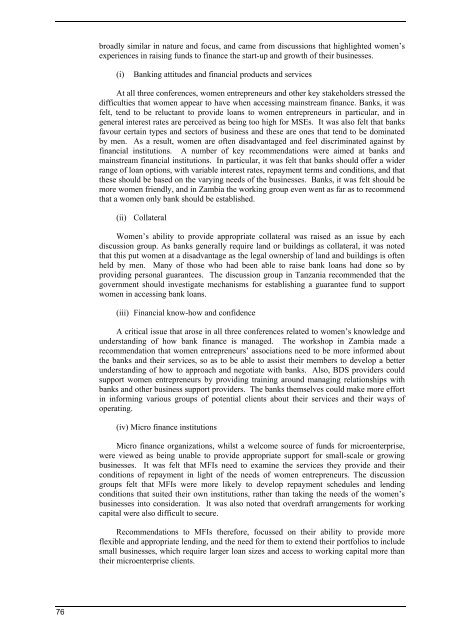The Challenges of Growing Small Businesses - International Labour ...
The Challenges of Growing Small Businesses - International Labour ...
The Challenges of Growing Small Businesses - International Labour ...
Create successful ePaper yourself
Turn your PDF publications into a flip-book with our unique Google optimized e-Paper software.
oadly similar in nature and focus, and came from discussions that highlighted women’s<br />
experiences in raising funds to finance the start-up and growth <strong>of</strong> their businesses.<br />
(i)<br />
Banking attitudes and financial products and services<br />
At all three conferences, women entrepreneurs and other key stakeholders stressed the<br />
difficulties that women appear to have when accessing mainstream finance. Banks, it was<br />
felt, tend to be reluctant to provide loans to women entrepreneurs in particular, and in<br />
general interest rates are perceived as being too high for MSEs. It was also felt that banks<br />
favour certain types and sectors <strong>of</strong> business and these are ones that tend to be dominated<br />
by men. As a result, women are <strong>of</strong>ten disadvantaged and feel discriminated against by<br />
financial institutions. A number <strong>of</strong> key recommendations were aimed at banks and<br />
mainstream financial institutions. In particular, it was felt that banks should <strong>of</strong>fer a wider<br />
range <strong>of</strong> loan options, with variable interest rates, repayment terms and conditions, and that<br />
these should be based on the varying needs <strong>of</strong> the businesses. Banks, it was felt should be<br />
more women friendly, and in Zambia the working group even went as far as to recommend<br />
that a women only bank should be established.<br />
(ii) Collateral<br />
Women’s ability to provide appropriate collateral was raised as an issue by each<br />
discussion group. As banks generally require land or buildings as collateral, it was noted<br />
that this put women at a disadvantage as the legal ownership <strong>of</strong> land and buildings is <strong>of</strong>ten<br />
held by men. Many <strong>of</strong> those who had been able to raise bank loans had done so by<br />
providing personal guarantees. <strong>The</strong> discussion group in Tanzania recommended that the<br />
government should investigate mechanisms for establishing a guarantee fund to support<br />
women in accessing bank loans.<br />
(iii) Financial know-how and confidence<br />
A critical issue that arose in all three conferences related to women’s knowledge and<br />
understanding <strong>of</strong> how bank finance is managed. <strong>The</strong> workshop in Zambia made a<br />
recommendation that women entrepreneurs’ associations need to be more informed about<br />
the banks and their services, so as to be able to assist their members to develop a better<br />
understanding <strong>of</strong> how to approach and negotiate with banks. Also, BDS providers could<br />
support women entrepreneurs by providing training around managing relationships with<br />
banks and other business support providers. <strong>The</strong> banks themselves could make more effort<br />
in informing various groups <strong>of</strong> potential clients about their services and their ways <strong>of</strong><br />
operating.<br />
(iv) Micro finance institutions<br />
Micro finance organizations, whilst a welcome source <strong>of</strong> funds for microenterprise,<br />
were viewed as being unable to provide appropriate support for small-scale or growing<br />
businesses. It was felt that MFIs need to examine the services they provide and their<br />
conditions <strong>of</strong> repayment in light <strong>of</strong> the needs <strong>of</strong> women entrepreneurs. <strong>The</strong> discussion<br />
groups felt that MFIs were more likely to develop repayment schedules and lending<br />
conditions that suited their own institutions, rather than taking the needs <strong>of</strong> the women’s<br />
businesses into consideration. It was also noted that overdraft arrangements for working<br />
capital were also difficult to secure.<br />
Recommendations to MFIs therefore, focussed on their ability to provide more<br />
flexible and appropriate lending, and the need for them to extend their portfolios to include<br />
small businesses, which require larger loan sizes and access to working capital more than<br />
their microenterprise clients.<br />
76
















